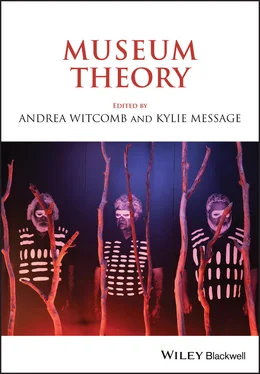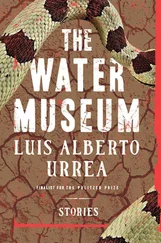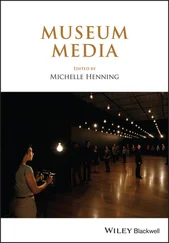1 Cover
2 Title page
3 Copyright
4 LIST OF ILLUSTRATIONS
5 EDITORS
6 GENERAL EDITORS
7 CONTRIBUTORS
8 ACKNOWLEDGMENTS
9 EDITORS’ PREFACE TO MUSEUM THEORY AND THE INTERNATIONAL HANDBOOKS OF MUSEUM STUDIES
10 INTRODUCTION: – MUSEUM THEORY: An Expanded Field
11 PART I: Thinking about Museums 1. THINKING (WITH) MUSEUMS: From Exhibitionary Complex to Governmental Assemblage The perspective of the exhibitionary complex Limitations of the exhibitionary complex Museums as governmental assemblages Conclusion Notes References 2. FOUCAULT AND THE MUSEUM The discourse of the museum Seeing and the power of the museum Museum fragments and the space between saying and seeing Conclusion: Seeing in the space of the already said References 3. WHAT, OR WHERE, IS THE (MUSEUM) OBJECT?: Colonial Encounters in Displayed Worlds of Things Colonial encounters The thing returns the gaze Prosopopoeia: The object’s point of view Notes References 4. ANARCHICAL ARTIFACTS: Museums as Sites for Radical Otherness The times are a-changing Affect, not emotion The museum as screen Beyond the horizon Theory behaving badly References 5. (POST?) CARTOGRAPHIC URGES: The Intersection of Museums and Tourism Introduction: Being in Venice Mobilities and performance Embodiment Materiality and mobility Concluding remarks Note References 6. MUSEUMS, HUMAN RIGHTS, AND UNIVERSALISM RECONSIDERED Universal museums Declaration of Universal Museums (2002), human rights, and universalism Human rights and museums New human rights museums The International Slavery Museum Federation of International Human Rights Museums Canadian Museum for Human Rights Museums and human rights discourses in conflict Conclusion: The particular and the universal – the international public sphere Note References Further Reading 7. THE DEMOCRATIC HORIZONS OF THE MUSEUM: Citizenship and Culture Horizons: Democracy, citizenship, participation Museums and civic cultures Museums and cultural citizenship Civic museums Note References 8. MUSEUMS, ECOLOGY, CITIZENSHIP Greener museums? Back at the Design Museum Philosophical dimensions/dementia Political-economic issues Environmental ripostes Notes References
12 PART II: Disciplines and Politics 9. REFLEXIVE MUSEOLOGY: Lost and Found In theory Into the Heart of Africa: A reflexive experiment Canonization Irony, postmodernism, and reflexivity Exposing colonial museology and ideology The artist as ironic trickster Postcolonial reflexivity Concluding remarks: Integrating reflexivity and practice Notes References 10. THE ART OF ANTHROPOLOGY: Questioning Contemporary Art in Ethnographic Display The parallel epistemologies of contemporary art andethnographic artifacts The aesthetics of new cultural museums Institutional critique within the ethnographic museum The freedom of the artist in the ethnographic museum? Pasifika Styles The Weltkulturen Museum Art and assemblage in ethnographic museums Conclusion Acknowledgments Notes References 11. CHANGE AND CONTINUITY: Art Museums and the Reproduction of Art-Museumness Transcending elitism: A contradictory desire Merging art and culture: A bridge too far Art museum without walls? Conclusion Note References 12. COOL ART ON DISPLAY: The Saatchi Phenomenon “The Saatchi phenomenon” and neoliberalism Newspeak: British Art Now The cool capitalist shark Coda: The capitalist pyramid Notes References 13. CONTENTIOUS POLITICS AND MUSEUMS AS CONTACT ZONES Contentious politics and museums as contact zones The Poor People’s Campaign: What kind of theory do we need? What is a good theory? Museums as contact zones: Toward a movement-relevant theory? Contentious politics: The National Museum of African American History and Culture Conclusion Notes References 14. EMOTIONS IN THE HISTORY MUSEUM Emotions Emotions in the museum Museums, history, communities, collective identities, and emotions Design as an emotional instrument The use of media Museums using objects for emotional effect Narrative stories Ethical considerations Conclusion Acknowledgments Note References 15. THE PRESENCE OF THE PAST: Imagination and Affect in the Museu do Oriente, Portugal Museums and affect Portuguese national identity and the empire The Museu do Oriente The Portuguese Presence in Asia Captivating artifices Utopian geographies Elusive temporalities Note References 16. TOWARD A PEDAGOGY OF FEELING: Understanding How Museums Create a Space for Cross-Cultural Encounters Genealogy The significance of narrative structure Conclusions Note References 17. THE LIQUID MUSEUM: New Institutional Ontologies for a Complex, Uncertain World Dynamical forces and the liquid museum Temporal reframing Uncertainty Complexity and nonlinearity The transnationalizing effects of climate change andglobalization Reworking the human and the social: Nature cultures Becoming liquid Museums as complex adaptive systems The liquid museum: A strategic simplification Museums as assemblage convertors Conclusion Note References
13 PART III: Theory from Practice/Practicing Theory 18. THE DISPLACED LOCAL: Multiple Agency in the Building of Museums’ Ethnographic Collections A brief revisionist perspective on the building of ethnographic collections Reflecting back from Australia Making Yolngu collections Collections as distributed memory A favorable conjunction of interests Reflecting back Baldwin Spencer Alfred Haddon The producers’ perspective Conclusion Acknowledgments Notes References 19. THE WORLD AS COLLECTED; OR, MUSEUM COLLECTIONS AS SITUATED MATERIALITIES Zombies of anatomy The other way around Collections as situated materialities Strategic omissions, hidden associations The nation collected Bodies of us and them as collected Old and new worlds collected, or strategic resituatings Acknowledgments References 20. AMBIENT AESTHETICS: Altered Subjectivities in the New Museum Cultures of distraction The new museum The Australian Centre for the Moving Image as “new” The Screen Gallery Ambient space Play and pedagogy Conclusion References 21. MUSEUM ENCOUNTERS AND NARRATIVE ENGAGEMENTS Background: Museums, visitors, and meanings Theoretical framework: Interpretive engagements as narrative meanings Translating theory into methodology: Narrative interviews at Te Papa Narrative engagements and cross–cultural meanings Conclusion Notes References 22. THEORIZING MUSEUM AND HERITAGE VISITING Heritage as a performance Museums and the three Ls: Learning and lifelong learning Methodology Commemorating and learning a forgotten history: The 1807 bicentenary of the British abolition of the slave trade Reinforcing and confirming: Museums and the performance of self Conclusion Acknowledgments Notes References 23. THE MUSEUM IN HIDING: Framing Conflict Lyndell Brown and Charles Green Amelia Barikin References 24. PRESERVING/SHAPING/CREATING: Museums and Public Memory in a Time of Loss Museums in contemporary life Preserving/shaping/creating the public memory of September 11 Note References 25. SITES OF TRAUMA: Contemporary Collecting and Natural Disaster The Victorian Bushfires Collection Oral history, but more so Forging change Conclusion Note References
14 Index
15 End User License Agreement
1 Chapter 8FIGURE 8.1 Design Museum exhibit.FIGURE 8.2 Design Museum poster.
2 Chapter 9FIGURE 9.1 M. NourbeSe Philip, excerpts from Looking for Livingstone: An Odyssey...
3 Chapter 10FIGURE 10.1 Interior shot of the Musée du Quai Branly, showing Visite du Plateau...FIGURE 10.2 Exterior shot of the National Museum of the American Indian, Washing...FIGURE 10.3 Wall of gold objects in the exhibition Our Peoples: Giving Voice to ...FIGURE 10.4 Lisa Reihana, He Tautoko , 2006, Museum of Archaeology and Anthropolo...FIGURE 10.5 Installation view of Otobong Nkanga, Facing the Opponent , a speciall...
Читать дальше












